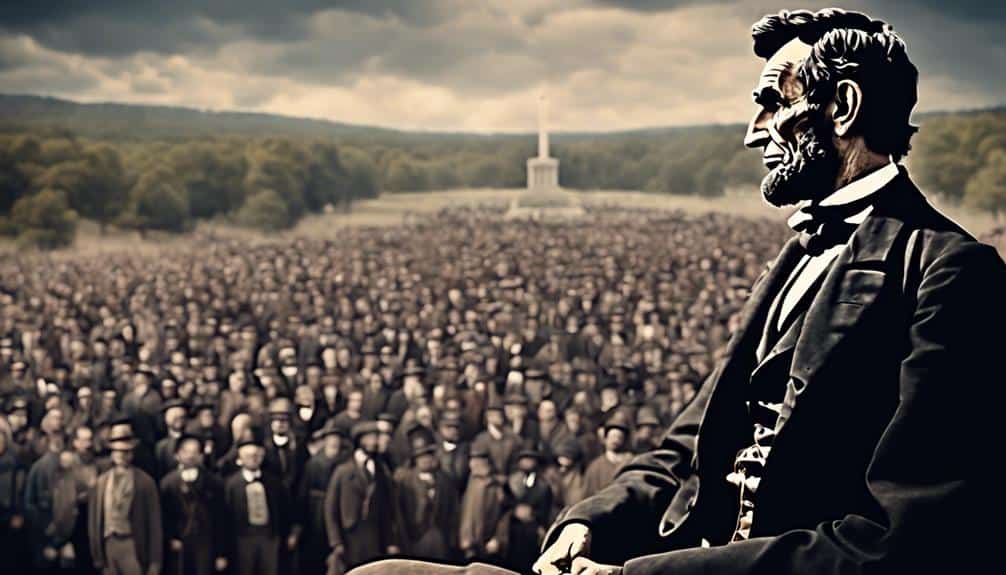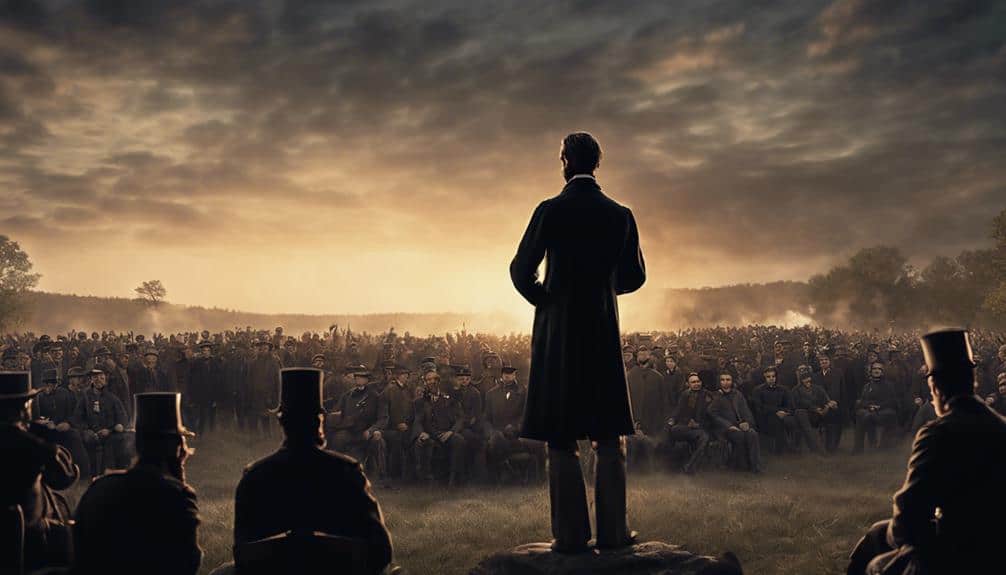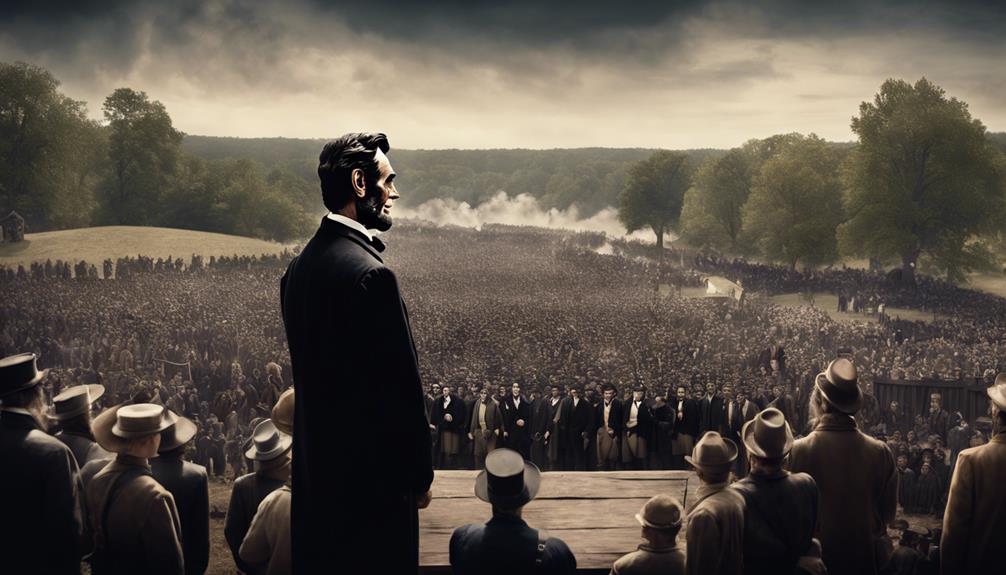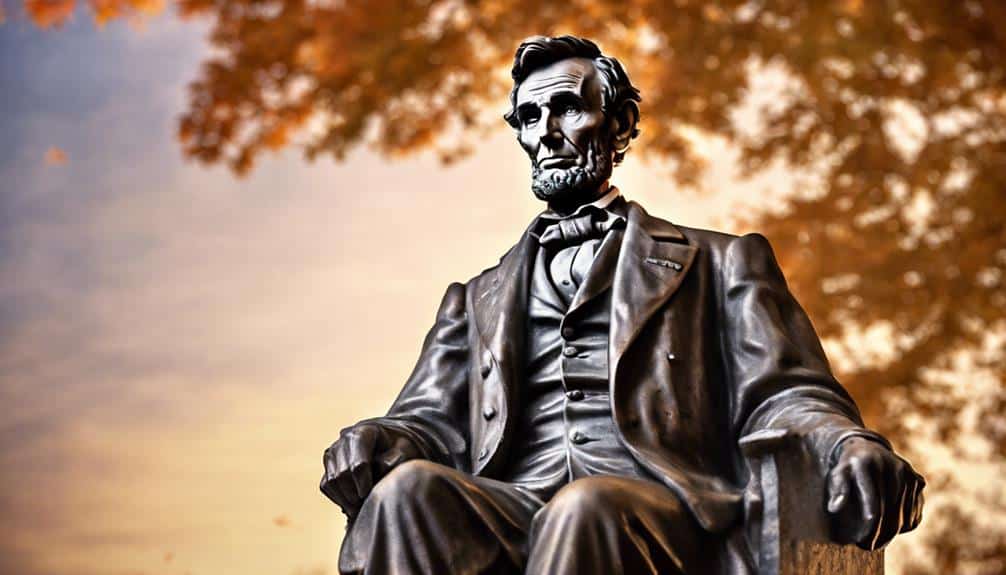Lincoln's Gettysburg Address transcended a mere eulogy for fallen soldiers, redefining the Civil War's purpose by emphasizing unity, liberty, and equality.
Discover how his profound words, initially met with mixed reactions, continue to resonate globally and shape America's democratic identity.
Historical Context
During one of the most tumultuous periods in American history, Abraham Lincoln delivered the Gettysburg Address in 1863, aiming to honor the fallen soldiers and underscore the importance of unity and equality. The speech took place at the Soldiers National Cemetery in Pennsylvania, a site chosen to commemorate those who perished in the Battle of Gettysburg, one of the bloodiest and most pivotal confrontations of the American Civil War. This battle marked a significant turning point by bolstering the Union cause and hindering Confederate advances.
Lincoln's address came at a critical juncture in the Civil War, a time when the nation's future was uncertain, and the principles of democracy were under severe threat. By invoking the sacrifices of the fallen soldiers, Lincoln sought to reaffirm the nation's commitment to the ideals of liberty and equality. His words were intended not just to console, but to rally a war-weary Union, emphasizing that the struggle must continue to make certain that 'government of the people, by the people, for the people, shan't perish from the earth.'
The historical context of the Gettysburg Address reflects Lincoln's strategic efforts to unify the country and uphold its democratic foundations during a period of profound crisis.
Key Themes

In examining Lincoln's Gettysburg Address, you'll notice how he emphasized liberty and equality, honored sacrifice and devotion, and reinforced democracy and unity.
Lincoln's words connected the soldiers' sacrifices to the broader ideals of the nation, underscoring the importance of preserving these principles.
Liberty and Equality Emphasized
Lincoln's Gettysburg Address masterfully encapsulates the nation's enduring struggle to uphold the principles of liberty and equality. Delivered during the Civil War, Lincoln's speech was a poignant reminder of the foundational principles upon which the United States was built. By emphasizing liberty and equality, Lincoln highlighted the importance of these values not just as abstract ideals, but as essential components of the nation's identity and future.
During the Civil War, the fight for freedom and equality wasn't merely a conflict between North and South but a profound moral and existential endeavor. Lincoln's words at Gettysburg underscored this by referencing the sacrifices of Union soldiers who fought to preserve these core principles. The Gettysburg Address served as a call to action, urging the nation to continue working for a more perfect union where liberty and equality are accessible to all citizens.
In emphasizing these themes, Lincoln sought to inspire future generations, reminding them that the United States' commitment to these principles must never falter. His concise yet powerful speech reinforced the idea that upholding liberty and equality is a continuous effort, essential for the nation's progress and unity.
Sacrifice and Devotion Honored
Through his eloquent address, Lincoln movingly honored the profound sacrifice and steadfast dedication of the soldiers who fought at Gettysburg. His use of the phrase 'last full measure of devotion' underscored the ultimate sacrifice made by the fallen soldiers in the Civil War. By emphasizing their commitment to the Union cause, Lincoln highlighted the critical importance of upholding the values of liberty and equality.
Lincoln's speech went beyond mere commemoration; it served as a call to the living to continue the struggle for these ideals. He urged the audience to honor the fallen soldiers not just in words, but through continued dedication to the nation's founding principles. This call to action reinforced the idea that the sacrifices made weren't in vain but were essential in the broader fight for freedom and justice.
The significance of these sacrifices is echoed in places like Arlington National Cemetery, a lasting symbol of the cost of freedom and the dedication of those who've served. Lincoln's address, in this way, remains a powerful reminder of the heavy price of liberty and the enduring need to honor those who've given their lives for equality and the Union cause.
Democracy and Unity Reinforced
The Gettysburg Address powerfully reinforced the core tenets of democracy and unity by asserting that government should be 'of the people, by the people, for the people.' Lincoln's speech is a clarion call for the preservation of the Union and the values it embodies. By emphasizing a government of the people, Lincoln underscores the democratic principle that political power originates from the citizens. This reinforces the concept of liberty, where each individual's rights are protected and upheld.
Lincoln's Gettysburg Address also highlights the importance of equality as a cornerstone of democracy. His words serve as a reminder of the nation's founding ideals and a call to action to guarantee these principles are realized for all citizens, especially amidst the turmoil of the Civil War. Through his address, Lincoln aimed to inspire national unity, urging the divided nation to come together and uphold these shared values.
The address symbolized a renewed dedication to the principles of democracy and acted as a unifying force. Lincoln believed that the survival of democratic governance depended on national unity. His speech at Gettysburg was both a reflection of enduring democratic ideals and a plea for collective resolve to overcome the nation's greatest challenges.
Analyzing Core Messages

Emphasizing the ideals of liberty and equality, Lincoln's Gettysburg Address calls upon the living to honor the sacrifices of fallen soldiers by upholding the nation's foundational principles.
In his brief yet powerful speech, Lincoln articulated that the men who perished at Gettysburg did so for the noble ideals that 'all men are created equal.' The address served not only as a dedication to the soldiers' sacrifice but also as a call to action for the living to continue their work.
Lincoln's message underscored the importance of liberty and equality as cornerstones of the American experiment. He sought to inspire his audience by reminding them that the soldiers' deaths weren't in vain but were part of a larger effort to uphold these values.
This speech aimed to solidify a legacy rooted in dedication and sacrifice, urging the living to guarantee that the nation's principles endure.
Lincoln's Intentions

Lincoln's intentions behind the Gettysburg Address were to honor the fallen while rallying the nation around the principles of democracy, liberty, and equality. Abraham Lincoln crafted his speech to pay tribute to the fallen soldiers of the Battle of Gettysburg. By doing so, he sought to emphasize the immense sacrifices made for the preservation of the Union. Lincoln wanted to inspire the living to continue the work of those who'd perished, reinforcing the commitment to American ideals such as democracy and liberty.
Lincoln's Gettysburg Address wasn't just a memorial; it was a call to action. He aimed to unite a nation that was deeply divided by civil war. By highlighting the sacrifices of the fallen soldiers, Lincoln underscored the importance of national unity. He wanted to convey that the struggle for equality and democracy was far from over and that honoring the fallen required a renewed dedication to these principles.
The speech also sought to establish an enduring legacy, ensuring that future generations would uphold the ideals for which so many had given their lives. Lincoln's words were meant to inspire a collective resolve to continue the work of democracy and maintain the nation's unity and purpose.
Public Reaction

Public reaction to Lincoln's Gettysburg Address ranged from ridicule to profound admiration, illustrating the speech's complex reception. Some journalists, particularly from The London Times and The Chicago Times, criticized the address for its brevity and simplicity, reflecting a divisive reception. These criticisms underscored the contrasting perceptions of Lincoln's words, with some viewing them as inadequate for the solemn occasion.
Despite these initial criticisms, many attendees at the event were deeply moved by Lincoln's powerful delivery. The emotional impact of his words resonated strongly with those present, creating a lasting legacy that underscored the speech's significant impact. Lincoln's concise yet poignant address managed to encapsulate the nation's ideals and the profound sacrifices made on the battlefield, touching the hearts of many who heard it.
The public reaction highlights the speech's ability to evoke strong emotions and its enduring resonance. While some criticized the simplicity of Lincoln's words, the powerful delivery and the emotional impact left an indelible mark on attendees. This divisive yet significant reception ultimately cemented the Gettysburg Address as one of the greatest speeches in American history.
Global Impact

You can see how Lincoln's Gettysburg Address didn't just resonate within the United States but also sent a powerful message globally. It promoted democratic ideals, warning European powers against meddling in the Civil War and emphasizing the significance of democracy.
This speech not only influenced international perceptions but also underscored the wider consequences of democracy's success or failure.
Democratic Ideals Promoted Globally
The Gettysburg Address greatly projected democratic ideals onto the global stage by accentuating the principles of equality and liberty. Lincoln's speech wasn't just a call for national unity but a beacon promoting a new birth of freedom. By highlighting these democratic ideals, he underscored the global promotion of equality and liberty, aiming to reshape diplomatic relations and global perceptions.
Lincoln's address also served as a warning to foreign powers. He emphasized the importance of democracy and unity, subtly cautioning against any interference in the Civil War. This message had significant implications for diplomatic relations, as it reinforced the idea that the failure of democracy in the United States could have dire global consequences.
Moreover, the address resonated with global audiences, reinforcing the significance of democratic ideals and unity. It highlighted that the struggle for democracy wasn't confined to America but was a universal endeavor.
Lincoln's words at Gettysburg thereby acted as a catalyst for the global promotion of these principles, encouraging other nations to value and adopt similar ideals. Through this speech, Lincoln effectively communicated that the fight for democracy and liberty was a global pursuit, fostering international support for these enduring principles.
International Response and Influence
Lincoln's Gettysburg Address not only reverberated within the United States but also elicited significant reactions and reflections from the international community. Abraham Lincoln's concise yet profound words carried a powerful message of national unity and democracy, resonating far beyond American borders.
European nations, keenly observing the Civil War, interpreted Lincoln's address as a warning against interference. By emphasizing democratic principles, Lincoln underscored the broader implications for self-governing nations. His speech suggested that the success or failure of democracy in the United States would have profound diplomatic implications globally.
The international response highlighted the global influence of Lincoln's words. Leaders and intellectuals in Europe saw the address as a reinforcement of democratic ideals at a time when many nations were grappling with autocratic rule. The Gettysburg Address hence became a beacon for those advocating for democratic reforms and national unity in their own countries.
Lincoln's articulation of democracy's significance provided a moral framework that extended beyond the immediate context of the Civil War. It encouraged a global reflection on the viability and value of democratic principles, shaping international attitudes toward governance and self-determination.
Symbolism in Global Democracy
By emphasizing democracy and unity, Lincoln's Gettysburg Address has become a lasting symbol of the global struggle for freedom and self-determination. Lincoln's profound words transcended the Civil War, signaling to European nations the United States' unwavering commitment to democratic principles.
The Gettysburg Address served not just as a national rallying cry, but as a stern warning to foreign powers to avoid interference in America's internal conflict.
Internationally, Lincoln's speech shaped diplomatic relations by reinforcing the importance of democracy on a global scale. His articulation of unity and democratic values resonated with other self-governing nations, affirming the significant consequences of democracy's failure. Countries worldwide viewed the address as a proof of the enduring fight for democratic ideals and the self-determination of people.
Moreover, Lincoln's address underscored the broader implications of the Civil War, influencing global perceptions of America's political landscape. The speech's enduring relevance showcases how Lincoln's words continue to symbolize the universal struggle for freedom and the indispensable role of democratic principles in fostering global unity.
Enduring Legacy

Through its eloquent expression of sacrifice, democracy, and unity, the Gettysburg Address continues to shape and reflect the core values of American society. Lincoln's Gettysburg Address endures as a potent reminder of the principles that define the nation: equality, liberty, and national unity. His succinct yet powerful words encapsulate the essential American values, emphasizing the sacrifices made to uphold democracy.
The enduring legacy of the Gettysburg Address extends beyond its historical context, resonating with contemporary audiences globally. It serves as a cornerstone of American principles, reinforcing the pursuit of equality and liberty. By highlighting the sacrifices made during the Civil War, Lincoln's speech underscores the ongoing struggle for freedom and the importance of maintaining democratic ideals.
Reflecting on the address while visiting the Gettysburg battlefield amplifies its relevance, reminding you of the significant cost of preserving these values. The speech's timeless message continues to inspire future generations to cherish and uphold the principles of democracy and national unity.
Essentially, the Gettysburg Address isn't just a historical artifact but a living document that continually informs and guides the ethos of American society.


